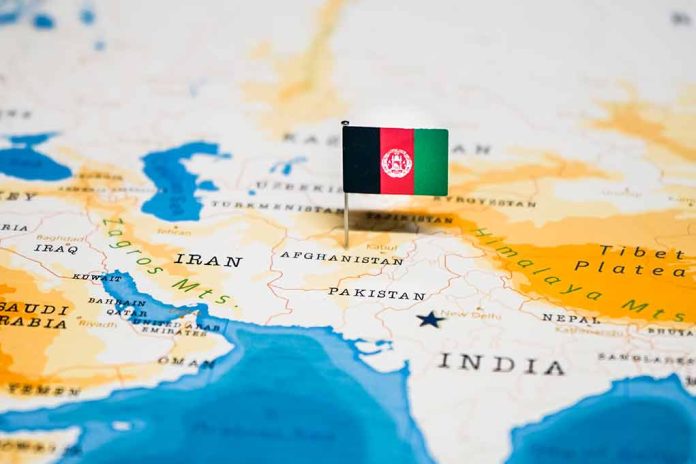
Russia urgently calls for de-escalation between nuclear-armed neighbors India and Pakistan as tensions reach a critical point after a deadly terrorist attack in Kashmir left 26 civilians dead, drawing parallels to the 2008 Mumbai attacks.
Key Takeaways
- A militant attack in Pahalgam, Indian-administered Kashmir, resulted in 26 civilian deaths, with India accusing Pakistan-based militant groups
- The Kremlin has formally urged both nations to reduce tensions, with Russian President Vladimir Putin personally reassuring Indian Prime Minister Narendra Modi of Russia’s support
- Pakistan has conducted a second missile test since tensions began, while diplomatic channels remain open despite both countries implementing retaliatory measures
- Russia has offered to mediate the conflict, with Foreign Minister Sergei Lavrov already communicating with both nations
- Military escalation thresholds have increased since 2016, with cross-border strikes becoming more common between the nuclear powers
Kremlin Steps In As Regional Tensions Escalate
The Kremlin has made an urgent call for de-escalation between India and Pakistan following a deadly terrorist attack in Kashmir that threatens to destabilize the entire region. With both nuclear-armed nations locked in a dangerous standoff, Moscow has positioned itself as a potential mediator in the crisis. Kremlin spokesman Dmitry Peskov expressed serious concern over the rapidly deteriorating situation and called for immediate measures to reduce tensions between the longtime rivals, emphasizing Russia’s commitment to regional stability and peaceful resolution of conflicts.
Russia maintains particularly close ties with India as its largest weapons supplier, while also valuing its relationship with Pakistan. This unique position gives Moscow potential leverage as a mediator at a critical moment when diplomatic channels are still functioning but under intense strain. President Vladimir Putin has already assured Indian Prime Minister Narendra Modi of Russia’s strong partnership, underscoring the strategic importance Moscow places on preventing further escalation that could throw a significant portion of Asia into chaos.
Attack Triggers Crisis With Familiar Pattern
The current crisis was sparked by a militant attack in Pahalgam, Indian-administered Kashmir, which resulted in 26 civilian deaths. Indian authorities have drawn direct comparisons between this incident and previous major attacks, particularly the 2008 Mumbai attacks that killed 166 people. India has firmly accused Pakistan-based militant groups of orchestrating the Pahalgam attack, while Pakistan vehemently denies any involvement. This pattern of accusation and denial has become a familiar cycle in the troubled relationship between the two nations.
“There are striking parallels between the aftermath of the Pulwama bombing and the killings in Pahalgam,” said Ajay Bisaria, former Indian High Commissioner to Pakistan
The attack has pushed both countries toward a dangerous brink, with the threshold for military escalation having increased significantly since 2016. Cross-border strikes and aerial operations have become more common responses to terrorist incidents, with India previously conducting surgical strikes in 2016 and airstrikes in Balakot in 2019 following similar provocations. While India has not yet taken military action in response to the Pahalgam attack, the situation remains fluid and tense, with analysts warning that miscalculation by either side could lead to rapid escalation.
BREAKING – Russia calls for de-escalation in India-Pakistan tensionshttps://t.co/AxlnVwnksk
— Insider Paper (@TheInsiderPaper) May 5, 2025
Diplomatic and Economic Measures Already Underway
India has responded to the Pahalgam attack with significant diplomatic and economic measures rather than immediate military action. These include closing borders, suspending treaties, expelling diplomats, and implementing various trade restrictions. Pakistan has retaliated with its own measures, including visa suspensions and airspace restrictions. The situation has escalated further with Pakistan conducting a second missile test since tensions began, demonstrating military readiness while simultaneously engaging in diplomatic outreach through various channels.
“This attack carries elements of Pulwama, but much more of Mumbai,” said Ajay Bisaria, former Indian High Commissioner to Pakistan
Of particular concern is the status of the Indus Waters Treaty, which India has threatened to reconsider. Any disruption to this longstanding agreement could have devastating long-term consequences for Pakistan, which depends heavily on rivers originating in India for its water supply. Meanwhile, India continues to push for international recognition of Jaish-e-Mohammad as a terrorist organization, intensifying diplomatic efforts to isolate Pakistan on the global stage while maintaining the option for more direct action if diplomatic channels fail to produce satisfactory results.
Russia’s Strategic Interests in Conflict Resolution
Russia’s intervention in this crisis reflects broader strategic considerations beyond merely preventing regional conflict. As a major arms supplier to India and with growing economic ties to Pakistan, Moscow has substantial interests in maintaining stability in South Asia. Russian Foreign Minister Sergei Lavrov has already communicated with officials from both countries, offering Russia’s services as a mediator and emphasizing the importance of dialogue over military confrontation. This active diplomatic engagement demonstrates Russia’s desire to strengthen its influence in the region at a time when global power dynamics are shifting.
“We’re once again in a conflict situation, and the story is unfolding in much the same way.” Ajay Bisaria, former Indian High Commissioner to Pakistan
While diplomatic channels remain open, the situation continues to evolve with regard to speed. Pakistan’s recent missile tests signal military readiness, while India weighs its response options. The Kremlin’s call for de-escalation represents an important diplomatic intervention at a critical moment, though whether it will succeed in bringing both sides to the negotiating table remains to be seen. With two nuclear powers involved and the memory of previous conflicts fresh in regional consciousness, the stakes could not be higher for South Asian stability and security.



